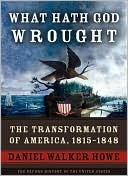In traditional society, the only items worth transporting long distances had been luxury goods, and information about the outside world had been one of the most precious luxuries of all. The transportation and communications revolutions made both goods and information broadly accessible. In doing so, they laid a foundation not only for widespread economic betterment and wider intellectual horizons but also for political democracy: in newspapers and magazines, in post offices, in nationwide movements to influence public opinion, and in mass political parties.
Welcome back. Just a moment while we sign you in to your Goodreads account.


